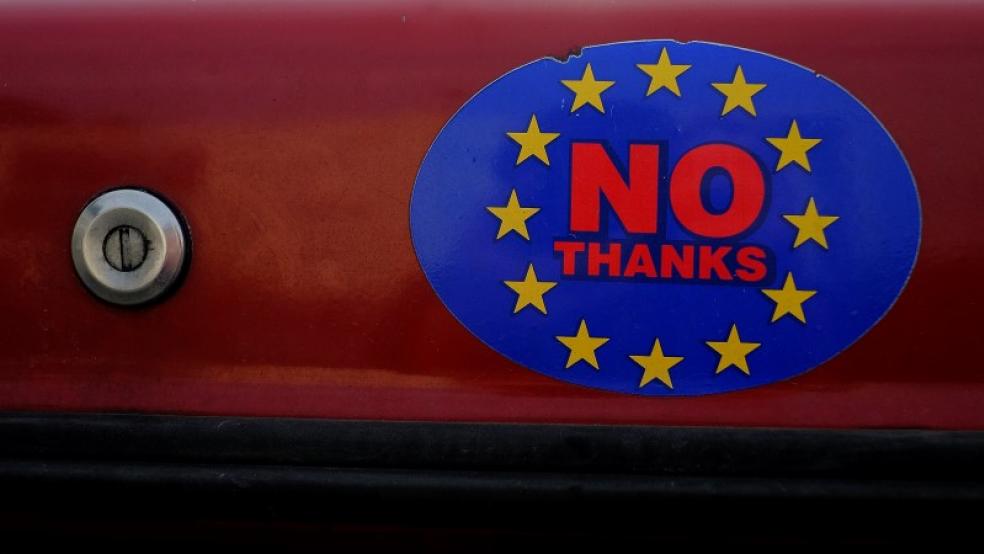What is Brexit?
Brexit, a portmanteau of the words “Britain” and “exit,” refers to Britain leaving the European Union.
Why do I keep hearing about it?
On Thursday, June 23, the U.K. will hold a referendum on whether Britain should leave the EU. The question to be voted on will be: “Should the United Kingdom remain a member of the European Union or leave the European Union?” The “Remain” and “Leave” supporters have been waging a fierce campaign to sway voters.
Related: How a Ban on Tea Kettles Could Drive Britain to a Brexit
Who can vote in the Brexit referendum?
British, Irish and Commonwealth citizens who live in the U.K., along with British citizens living abroad who have been on the U.K. electoral register for the past 15 years will be able to vote. Other EU citizens living in the U.K. (besides those from Ireland, Malta and Cyprus) will not be able to vote.
Why is Britain holding a referendum? Why now?
Before Britain’s last election in May 2015, Prime Minister David Cameron promised a referendum on membership in the EU. While Cameron supports Britain remaining in the EU, many of his Conservative members of Parliament do not.
Cameron decided to hold the referendum to settle a long-held rift between pro-EU and anti-EU factions of his party and pacify his critics on the far-right, notably the U.K. Independence Party.
Who’s leading the “Remain” and “Leave” sides?
Cameron is leading the “remain” side, while Conservatives Boris Johnson, a member of parliament and former mayor of London; Justice Secretary Michael Gove; and U.K. Independence Party leader Nigel Farage are leading the “leave” side.
Related: Markets May Be Too Complacent Over Brexit Risk, BlackRock Says
What are the arguments for leaving?
“Leave” campaigners argue that the costs and excessive regulations that come with EU membership outweigh the benefits. They claim that the U.K. could save £350 million ($490 million) a week that could be used for the U.K.’s own programs. If Britain leaves the EU, Brexit supporters say, it could take back control of employment laws, health and safety.
On trade, Brexit supporters claim leaving the EU would allow Britain to negotiate its own trade agreements free from interference from Brussels. The “leave” side also complains that that by being a part of the EU, Britain must allow EU citizens to live and work in the U.K., unnecessarily burdening the government’s health and social services programs. Instead, Brexit campaigners say they would like to set up a points-based, skills-driven immigration system that does not give preferential treatment to EU citizens.
On the international stage, Brexit supporters complain about being outvoted by other EU countries within the EU decision-making structure, and that by leaving the EU, the country would have more influence internationally.
What’s the case for staying?
Anti-Brexit advocates claim that the £340 ($477) a year cost per household for membership in the EU is small compared to benefits worth £3,000 ($4,200) per household each year. They note a key perk of being part of the EU is that U.K. businesses can trade with other EU countries without tariffs and barriers, while leaving the EU could harm businesses and threaten jobs.
Anti-Brexit campaigners also say that EU regulations protect British people by ensuring environmental standards, stability of the banking system, worker protections and anti-discrimination rules. They argue that immigration wouldn’t stop if Britain left the EU, noting that some European countries that are outside of the EU have greater per capita immigration levels. And they warn that Brexit could actually increase migration to the U.K. once immigration checkpoints have shifted from France to Dover.
On international relations, anti-Brexit supporters argue that being part of the EU allows Britain to be part of the decision-making process in Brussels, giving it additional clout in multilateral organizations such as the UN and the WTO.
Related: Investors Add Brexit Clauses to British Property Deals Before EU Vote
How long would it take for Britain to leave the EU?
A Brexit vote would trigger a series of negotiations that would last at least two years before separation from the EU could take place.
How close are the polls?
The Financial Times’ Brexit poll tracker shows a very narrow gap between the stay and leave sides, with the pro-Brexit side gaining ground in recent weeks.
How do businesses feel?
The latest poll conducted in May by the British Chambers of Commerce shows 54 percent of businesspeople prefer staying in the EU while 37 percent supporting leaving, with the rest “undecided” or “would not vote.” The May poll shows a drop in the remain campaign’s support among businesspeople, as a similar poll in February showed 60 percent supporting the remain side.
What would Brexit mean for the U.S.?
According to Census data, the U.K. is America’s seventh biggest trading partner and fifth biggest export market, with year-to-date exports totaling $18 billion. The U.S. is also the U.K.’s biggest trading partner, with British exports to the U.S. in April 2016 alone valued at £4.4 billion ($6.17 billion) according to U.K. government trade statistics. With Britain out of the EU, President Obama has warned that it could take 10 years for Britain to negotiate a new trade deal with the U.S.
Related: How a Brexit Could Sink Clinton and Hand the Election to Trump
Many American banks use London as a base to carry out business throughout Europe. Brexit could disrupt that. In fact, Fox Business News reported that Goldman Sachs, J.P. Morgan, Morgan Stanley and Citigroup together have contributed to the anti-Brexit campaign.
Tamim Bayoumi, senior fellow at the Peterson Institute for International Economics, told Marketplace.org that Brexit could cause complications for U.S. companies with U.K. operations.
“U.S. multinationals, for example, which have manufacturing in the U.K., might find it much more difficult to export to the European Union,” Bayoumi said. He added that U.S. companies would also have to deal with changing trade, immigration and labor rules.




